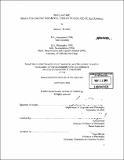| dc.contributor.advisor | Edward Hall. | en_US |
| dc.contributor.author | Roskies, Adina L., 1966- | en_US |
| dc.contributor.other | Massachusetts Institute of Technology. Dept. of Linguistics and Philosophy. | en_US |
| dc.date.accessioned | 2005-09-27T18:36:01Z | |
| dc.date.available | 2005-09-27T18:36:01Z | |
| dc.date.copyright | 2004 | en_US |
| dc.date.issued | 2004 | en_US |
| dc.identifier.uri | http://hdl.handle.net/1721.1/28834 | |
| dc.description | Thesis (Ph. D.)--Massachusetts Institute of Technology, Dept. of Linguistics and Philosophy, 2004. | en_US |
| dc.description | Includes bibliographical references. | en_US |
| dc.description.abstract | (cont.) Dennett's and Fodor's positions on propositional attitudes, and offer alternative criteria to theirs for what features a system must have to have propositional attitudes. | en_US |
| dc.description.abstract | This dissertation explores the relation between the mental lives of humans and animals, and argues that many of the differences that have been proposed by philosophers to set humans apart from animals are erroneous. Chapters 1 and 2 contest the hypothesis that the mental lives of humans and animals differ in kind because the content of human experience is conceptual--it necessarily involves the possession and exercise of concepts that characterize that content--whereas the content of animal experience is nonconceptual. In Chapter 1 I present an argument to expose the serious costs of such a view: if the content of our experience is entirely conceptual, then we cannot account for concept learning. The cost of denying nonconceptual content of experience is a radical nativism about concepts, a position which is both biologically and psychologically implausible. Chapter 2 further explores the implications of the learning argument put forth in Chapter 1. I consider the most effective defense conceptualists have wielded against arguments for nonconceptual content of experience: that our ability to form demonstrative concepts (concepts such as "that shade") obviates the need for nonconceptual content in experience. I show that nonconceptual content of experience is crucial in enabling us to form novel demonstrative concepts. Thus, far from being a strategy that allows the conceptualist to circumvent the need for nonconceptual content, appeal to demonstrative concepts further commits him to nonconceptual content of experience. Chapter 3 considers what cognitive resources are required to have propositional attitudes. I argue against Davidson's claim that animals can't think, because having propositional attitudes requires language. I consider | en_US |
| dc.description.statementofresponsibility | by Adina L. Roskies. | en_US |
| dc.format.extent | 151 p. | en_US |
| dc.format.extent | 8960475 bytes | |
| dc.format.extent | 8981010 bytes | |
| dc.format.mimetype | application/pdf | |
| dc.format.mimetype | application/pdf | |
| dc.language.iso | en_US | |
| dc.publisher | Massachusetts Institute of Technology | en_US |
| dc.rights | M.I.T. theses are protected by copyright. They may be viewed from this source for any purpose, but reproduction or distribution in any format is prohibited without written permission. See provided URL for inquiries about permission. | en_US |
| dc.rights.uri | http://dspace.mit.edu/handle/1721.1/7582 | |
| dc.subject | Linguistics and Philosophy. | en_US |
| dc.title | Enzo and Me : essay concerning the mental lives of humans and other animals | en_US |
| dc.type | Thesis | en_US |
| dc.description.degree | Ph.D. | en_US |
| dc.contributor.department | Massachusetts Institute of Technology. Department of Linguistics and Philosophy | |
| dc.identifier.oclc | 60363665 | en_US |
